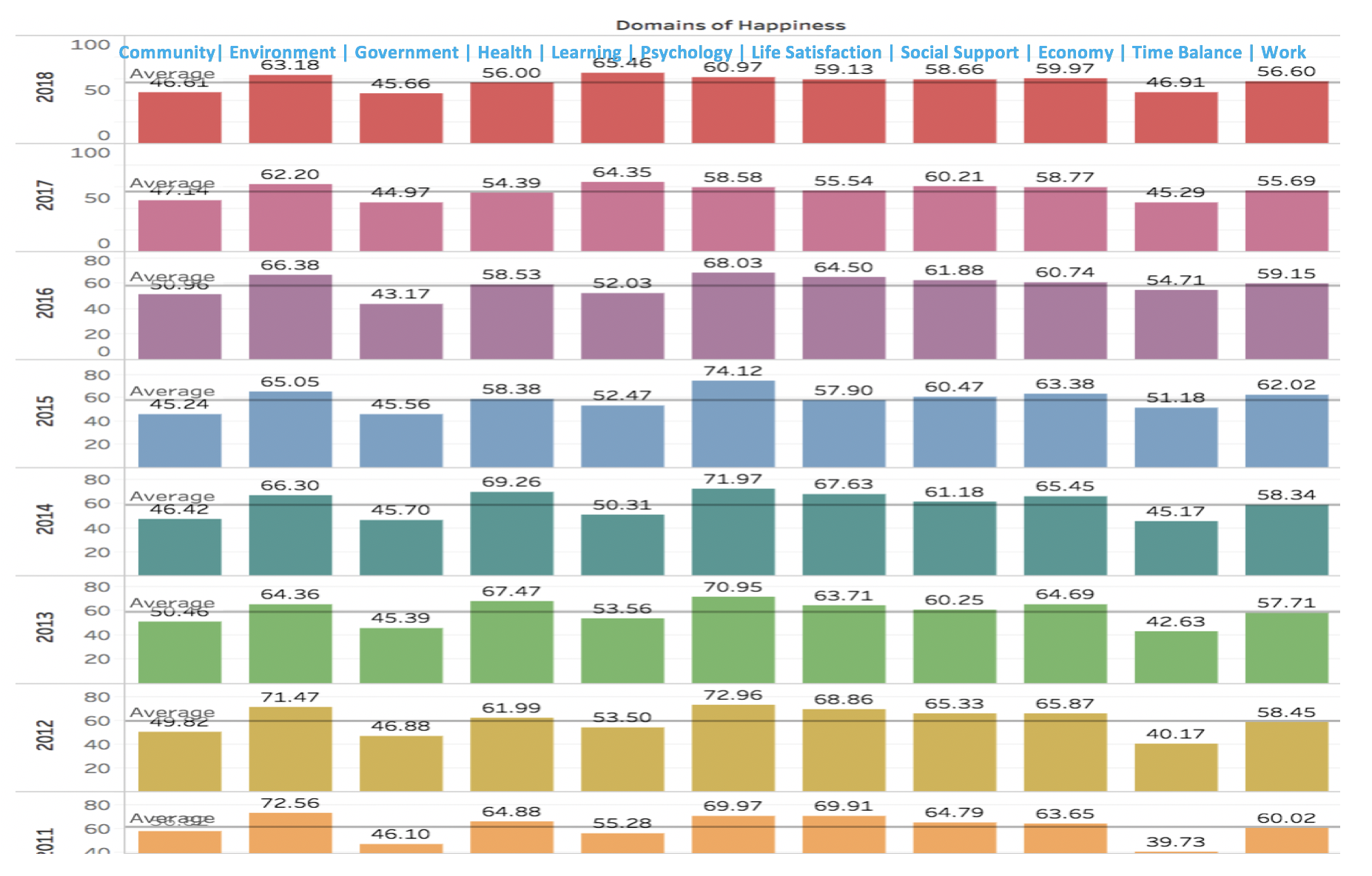The Happiness Alliance’s Happiness Index measures our happiness, well-being and sustainability. Our scores took a tumble in 2017. Are things looking up, or are we adjusting to tough times today and ahead?
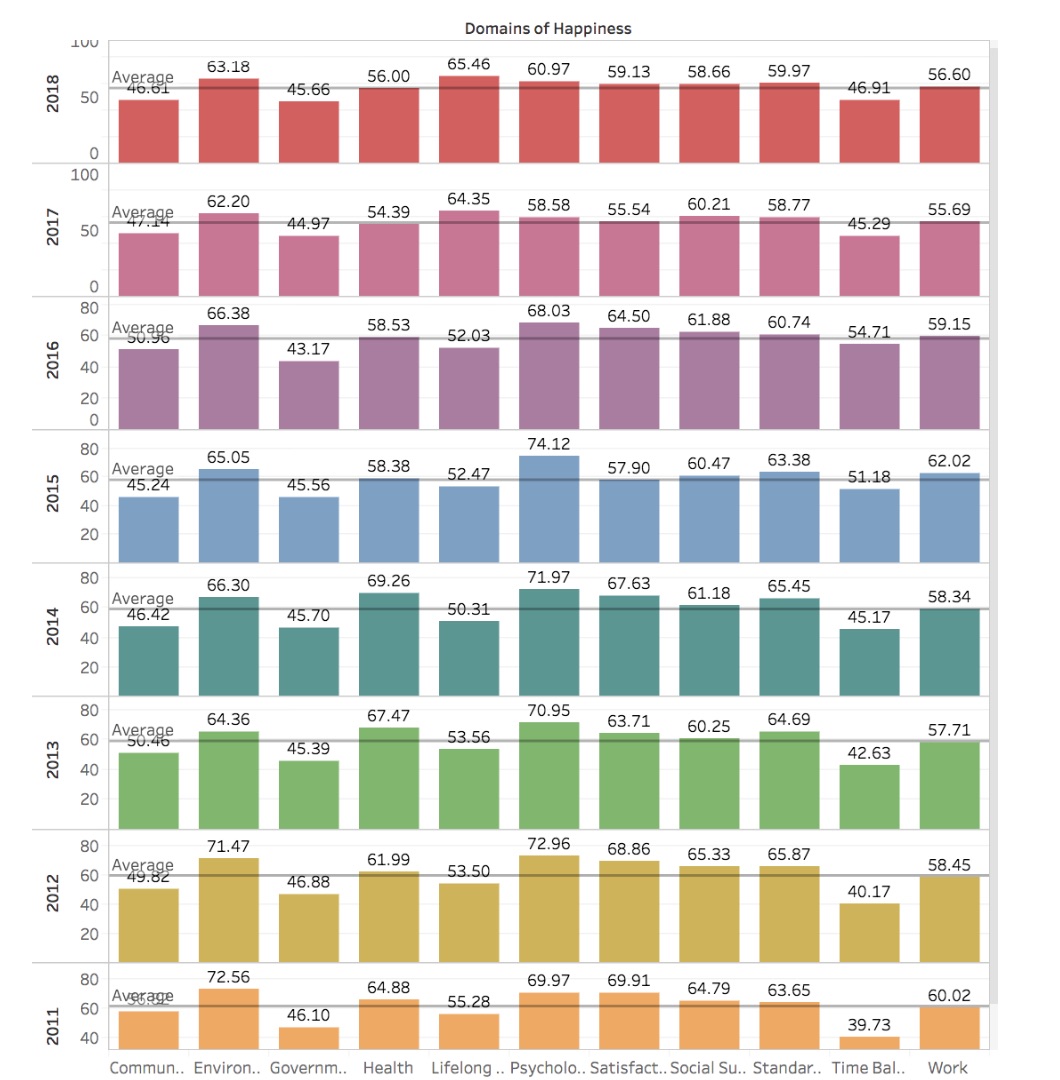
Happiness score for 2018 are in. We see a slight upturn in all the domains…except those that may matter the most.
In 2017, we registered a downturn in happiness. With the political climate in the United States and in may other nations, it was not too much of a surprise on one level, but nevertheless, seeing the scores was a bit shocking. We were unhappier in terms of our life satisfaction, economy, community, and work and every other domain except learning, culture, and strangely enough government. That said, government scores were the lowest of all the domains.
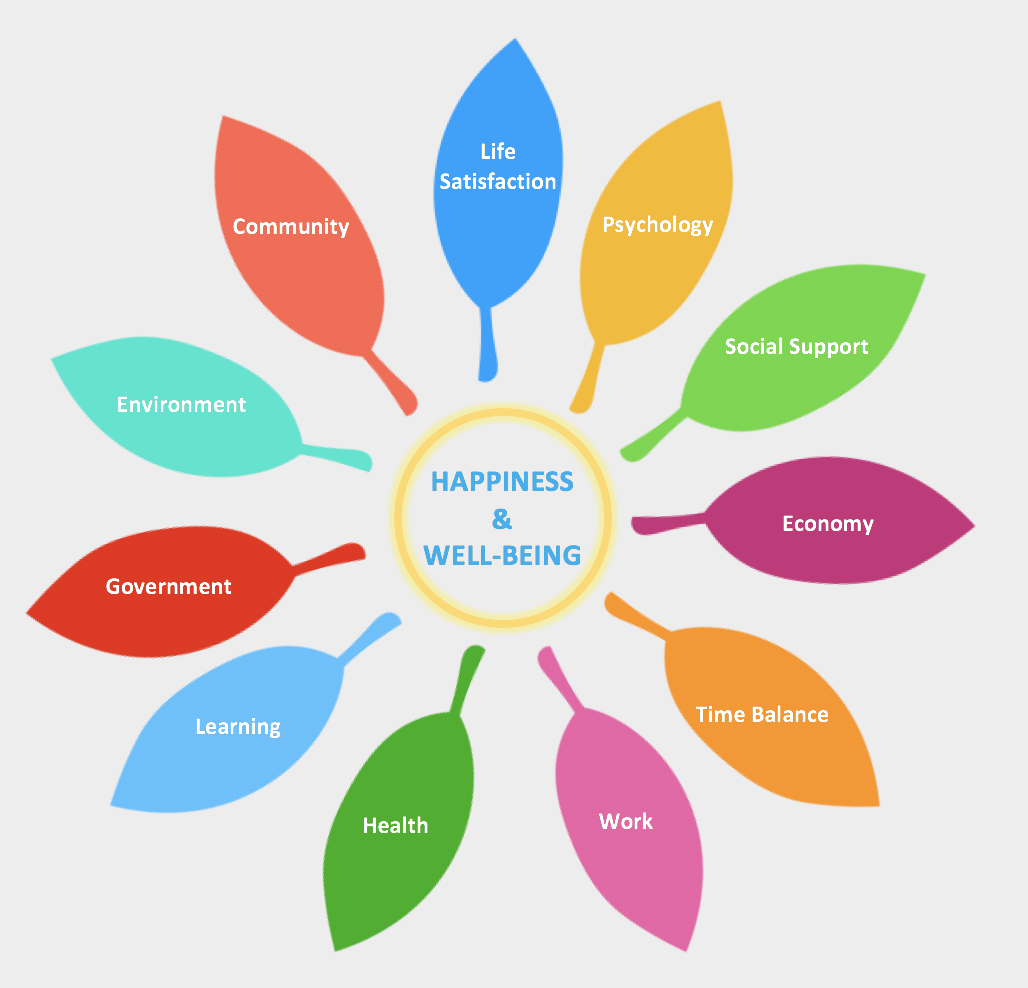
Now let’s compare to 2018. Our scores in many of the domains have gone up by one or two points, except life satisfaction, where we have jumped almost four points, giving us a 4% increase. In the domain of psychology, were we measure sense of purpose, optimism, self-esteem and efficacy, we jumped about two points. In the other domains, our increases were less than two points.
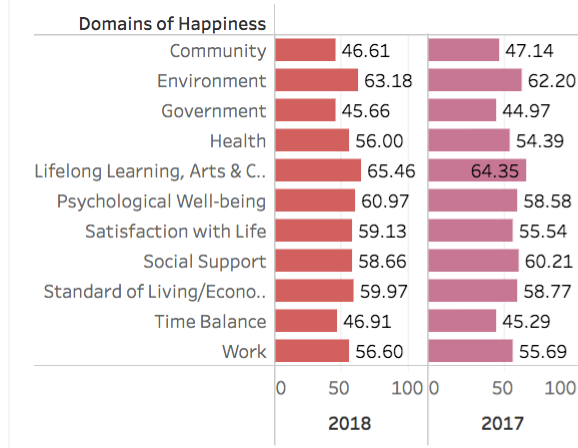
While these score are for only about 4,500 people who completed the Happiness Index (we have about a 30% finish rate), and from a convenience sampling, we suspect they are fairly accurate in reflecting the general population. Moreover, we suspect that our data would be reflective of people in the United States on both sides of political spectrum. Last year, we ground-truthed our data with the Gallup poll data, gathered from a random sampling. The Gallup data for 2018 is not yet released, but nevertheless, we suspect our data will pan out to reflect our state of well-being.
Where we hurt the most.


The domains of community and social support may be the most important domains of happiness. They are often the foundation allowing us to meet our basic needs and enjoy good mental and physical health.
Why is that?
Because we are social beings. We need each other. Our relationships are core to our happiness and well-being. In 2018, our scores in community and social support have gone down.
There could be many reasons for this. One of them is that in the United States, many people feel a growing divide between political perspective. There is a lasting tension. We propose that this situation is leading to a decline in trust and breakdown in communication on a a geographic scale, between urban and rural communities, and on a personal scale, between colleagues, friends, and within families.
How about you?
Has your happiness increased or decreased in any of the happiness domains in the last year? If so, has it changed because of a change in your life? For instance, did you find your true love, get the perfect job, or suffer a big loss? That would explain a change in a domain.
But if your life’s circumstances are not much different than last year and you are a bit more or less happy than last year, then why do you think that is? Do you feel that the political, media, or social climate is influencing your happiness. Use this happiness scorecard to reflect on your happiness changes in the last year.
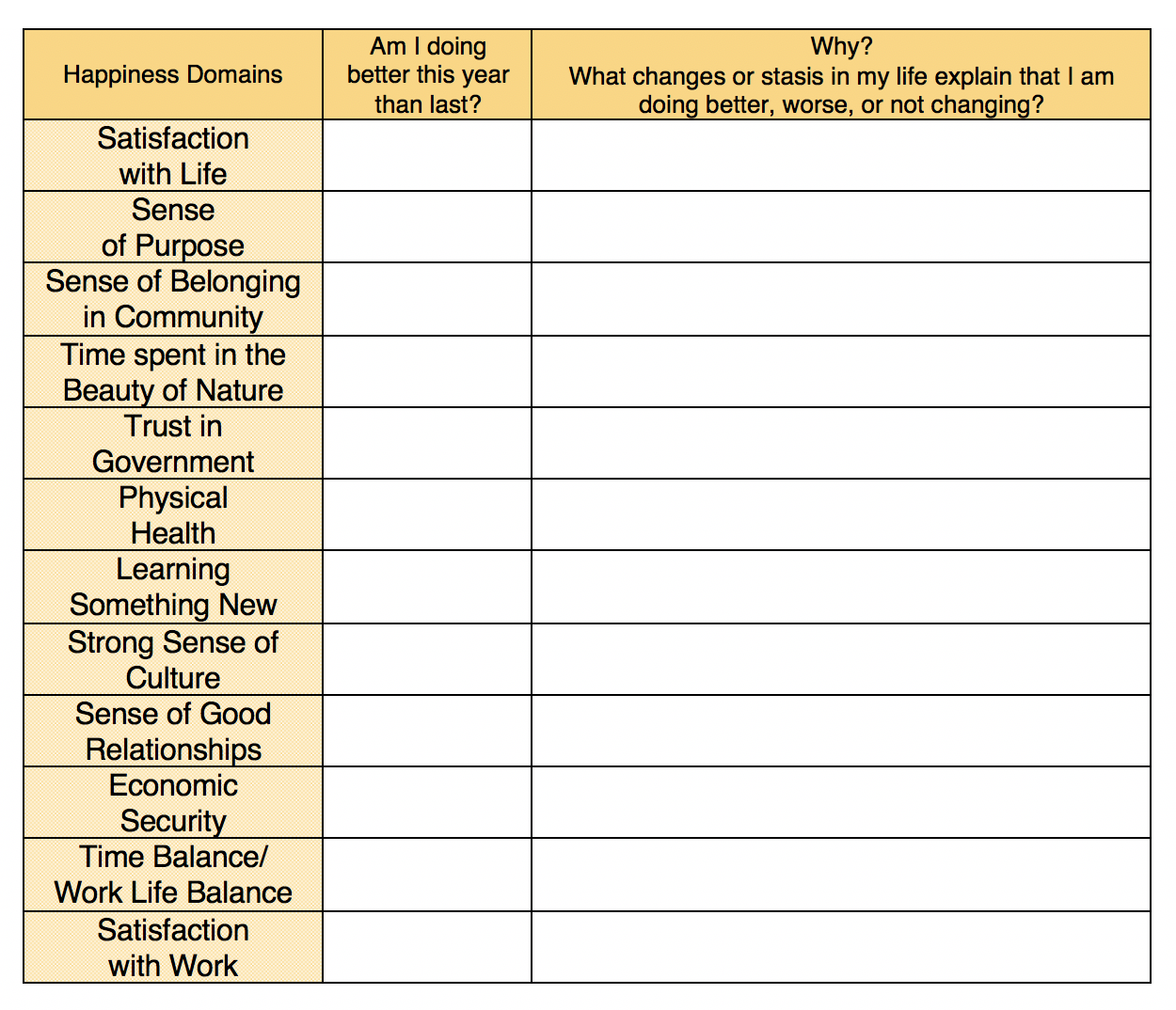
What you can do to be happier.
You happiness is based in part on your genetics, in part on your habits, and in part on your external circumstances. As of yet, there is nothing you can do to change your genetics. There is a lot you can do to change your habits (i.e. gratitude practices, exercise, spending more time with loved ones). The tricky part comes to your external circumstances. It may feel like there is nothing you can do to change the political climate, the landscape of your community, or social systems, but this is a mistake.
Often one of the reason we feel helpless or useless is that our expectation is that change will happen immediately. It would be nice if change happened that way, but in fact, it rarely does. Instead, it often takes time, patience and persistence. Sometimes change does appear to happen quickly, like a change in administration, a mudslide, or the flowering of spring blossoms, but even that change has been months or years in the making, with seemingly nothing happening for all the effort being made.
In short, don’t buy into the fiction that you can’t make a difference. In fact, every time you make an effort for change, you contribute to progress.

Ten things you can do right now for a change to happiness
Whether you made a New Year’s resolution this year or not, and whether you are fulfilling it or not, you can and will contribute to change in your life.
Change is inevitable.
The trick is to change intentionally. Hence, the first thing you can do for a change to happiness is to set your intention for happiness.
Here are ten things you can do right now for happiness:
1) Set an intention to be happy in your life and to bring happiness to others.
2) Define your happiness both in terms of how you feel and how you live (hedonism and eudaimonia).
3) Do something regularly that helps others and makes you feel like you are part of something bigger than yourself. It should be something that makes you feel good. This can be a small thing, like holding the door open for others to enter a structure, or contributing to a big thing, like undertaking a Happiness Initiative in your community.
4) Choose one domain of happiness, learn about it and share what you learn with others – online, in person, etc. (Take the Happiness Index survey to learn experientially about the domains of happiness.)
5) Dream up a plan for how you would change the world in that domain so you and others will be happier and healthier. Share your plan with others.
6) Develop your listening skills. Learn about active listening and non-violent communication.
7) Everyday, refrain from doing one small thing that would not make you happier, like sending a rash email, having a conversation with someone when you are upset, buying something you don’t need, or having an extra glass of wine. Instead, wait to act until you are feeling centered and happy.
8) Take one small step to foster the change you dreamt up in your plan.
9) Release an expectation that the change you wish to see will happen immediately. Remind yourself that you are part of a bigger picture, and even if you can’t see it right now, that you are part of a paradigmatic shift.
10) As much as possible, be the change you want to see – with the caveat that you do this in ways that bring you and others happiness. If the change is large scale and a systems change, find ways that are manageable and fulfilling and that are based on the values of your vision.
Every month this year we will publish a new Happiness Data Report. Subscribe to our newsletter or follow us here. The Happiness Alliance is a grassroots volunteer-run nonprofit 501(c)3 bringing tools and resources to community organizers for a Happiness Revolution. You are the Happiness Movement.
